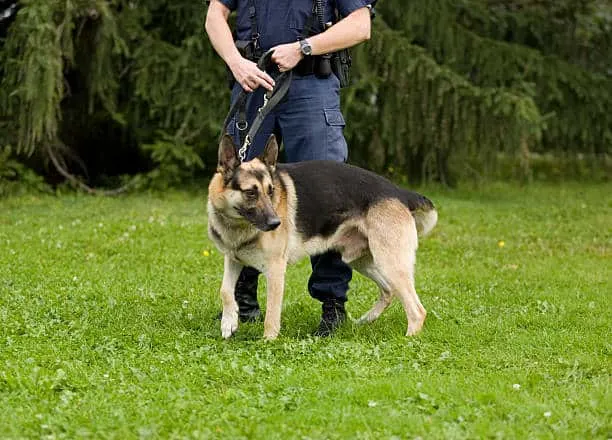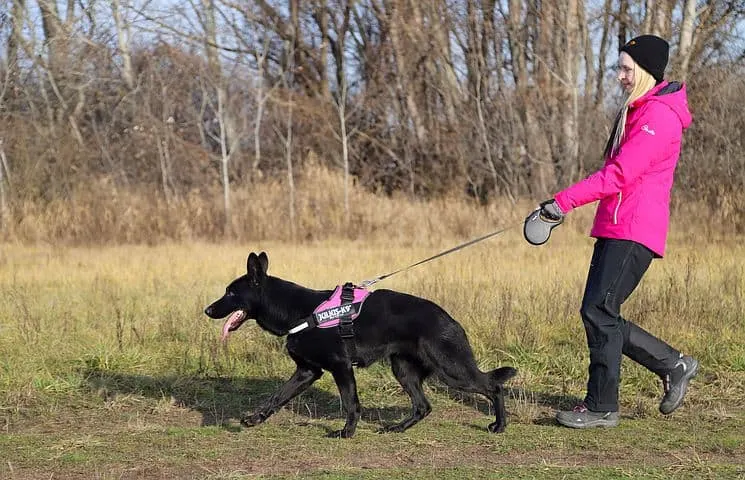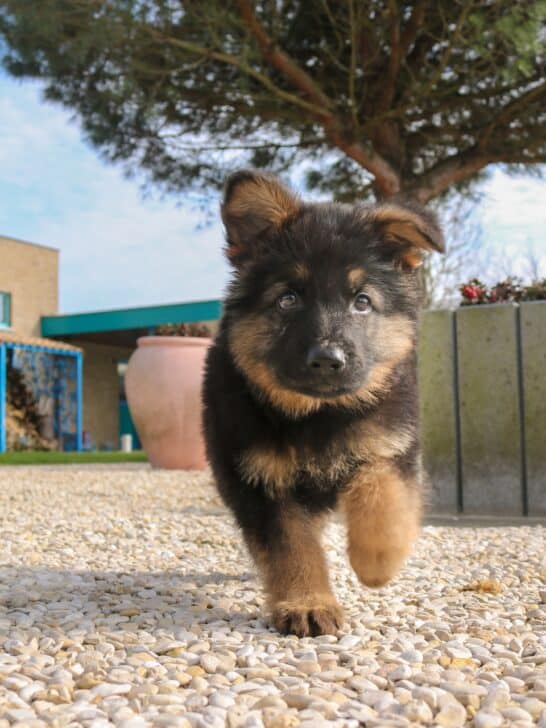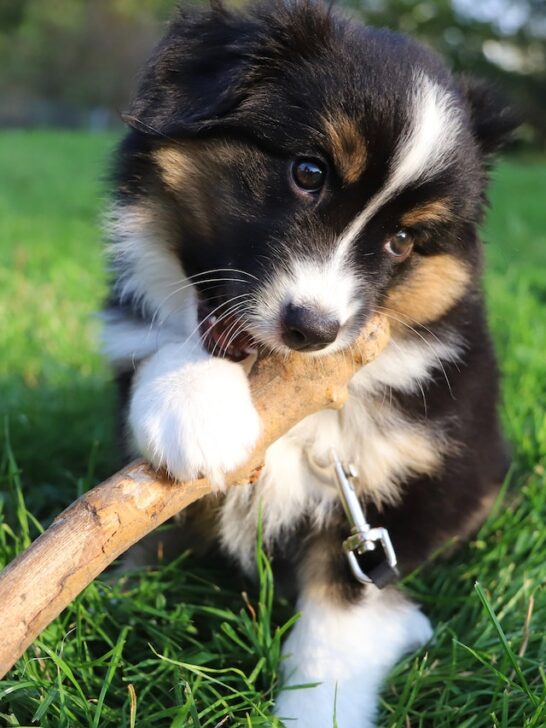Why Does My German Shepherd Walk In Front of Me: Understanding This Common GSD Behavior Pattern
German Shepherd dogs are beloved throughout the world for their many stellar qualities.
GSDs are known to be brave, affectionate, loving, protective, noble, and very intelligent.
These are all great qualities to have in your companion canine!
But the specific combination of traits that German Shepherds have can also lead to some behaviors that can puzzle new GSD owners.
For example, why does your dog always seem to want to walk in front of you?

In this article, we will break down this behavior for you so you understand what it means to your dog and how to address it.
Why Does My German Shepherd Walk In Front of Me?
The simplest reason your German Shepherd walks in front of you is often the right one – your dog is protecting you!
Another common reason many owners say their GSD walks in front of them is that their dog is so eager to exercise and burn off some of that famous German Shepherd energy.
But there can be other reasons as well, which we will spend the rest of this article exploring.
Why Your German Shepherd Pulls On the Leash & Walks Ahead of You
So far we have discussed some very positive reasons why your German Shepherd may insist on walking in front of you – protection and eagerness to exercise and play.
But there can also be some times when your dog’s insistence on walking in front of you stems from training, or even behavioral issues.
It is important to be able to tell the difference because you don’t want to put your dog, your family, or others in harm’s way because of a lack of training.
Poor leash training can be dangerous
Surprisingly, a lot of dog owners don’t realize that up to 88 percent of falls (up to 240 falls per day) that land people in the urgent care happen because the person’s pet trips them!
You definitely don’t want this to happen to you or anyone else in your family who takes your dog for walks.
So sometimes your German Shepherd may pull on the leash because they simply haven’t learned how to walk properly with you, as VetStreet explains.
This isn’t due to a lack of intelligence in German Shepherds.
This is an incredibly smart dog breed that can master new commands in five tries or less, on average.
In fact, German Shepherds consistently rank in the top 10 (out of 79 dog breeds) when going through different intelligence tests.
But puppies may have more trouble obeying you and remembering the commands they have learned.
So you will need to have some patience, and be sure to continue consistently training your GSD puppy.
But once your dog is an adult, you should absolutely expect your GSD to obey you and remember what they have learned.
This includes common walk commands like:
- “heel”
- “sit”
- “stay”
- “leave it”
- “come”
- or any other words you use to tell your dog what to do

The difference between protection and aggression in German Shepherds
Some German Shepherd owners may also not realize that properly training a dog doesn’t mean your GSD won’t protect when need be.
This is a common area of confusion that comes from not understanding the difference between protection and aggression.
The German Shepherd is a dog breed that is steeped in protective instincts, which means your dog needs more training, not less, to understand when protection is really needed.
When your dog obeys you at least 95 percent of the time, you don’t have to worry that your dog will act out of aggression as a result of getting mixed signals from you, their owner.
You will be able to give a single command and your dog will instantly come to your aid.
This is when German Shepherds really shine and are in their protective element because the dog is confident when you are clear and consistent in your commands.
Watch a German Shepherd Learning to Be a Protection Dog
This YouTube video gives you a quick look into the process of properly training a German Shepherd to be a loyal protector and guardian dog.
Understanding the German Shepherd Dog Breed History
A German Shepherd is first and foremost a working dog breed with a very unique breed history.
As the American Kennel Club (AKC) explains, German Shepherds were first bred to work alongside people herding and protecting livestock, and guarding people as well.
After livestock dogs were no longer in such high demand, the breed became well known for their abilities in personal protection, police, military and guard dog work.
German Shepherds are also an eternally popular breed choice to serve as guide dogs for the blind, search and rescue dogs, scent and tracking dogs, hunting dogs and therapy, and service dogs.
What do all of these job descriptions have in common?
German Shepherds live to serve with their people.
These dogs are famous for doing whatever it takes to get the job done well, and keep their charges (whether animal or human) safe.
This is why one of the most common reasons a German Shepherd will walk in front of you is to make sure they stand between you and any threat that may approach you.
Understanding the German Shepherd’s Activity & Energy Levels
As the German Shepherd Dog Club of Victoria explains, German Shepherds are dogs that really appreciate having lots of daily exercise and playtime.
If you have ever asked your German Shepherd puppy or adult dog if they would like to go on a W.A.L.K., or held up the leash, or even made a move towards the door and seen your dog’s eyes light up, you already know this is true!
The German Shepherd’s working dog background has given this breed a very high natural energy level.
This is great when your dog has an energetic and demanding job to do.
But it isn’t so great when your dog’s only real “job” is to be a companion canine.
Without plenty of exercise and stimulation, how will they everburn off all that extra energy every day?
So sometimes if your GSD is walking in front of you, it may simply be that they are raring to get going and eager to run and jump and romp and play and move about, as these dogs love to do.

What You Need to Know About Exercise and Young German Shepherds
However, if this is your first time caring for a large dog breed like the German Shepherd, it is also important to know these dogs take more time to grow up.
When your German Shepherd is a puppy, they are growing fast.
Their bones and muscles and ligaments and whole-body systems are growing and thus are more vulnerable to injury.
The growth plates in the bones are the centers that tell your dog’s bones when to keep growing and when to stop.
As long as the growth plates remain open, you need to be careful with exercise.
Exercising your GSD puppy or young adult dog too much too soon can cause pain and damage.
Also, irreparable injuries to the growth plates, bones and skeletal structure can sometimes happen because of too much exercise too early in a German Shepherd’s life.
The American Kennel Club (AKC) explains that a German Shepherd may grow to reach anywhere from 50 to 90 pounds, which means larger GSDs will grow for a longer period of time.
Learning the size and weight range of your puppy’s parent dogs can help you guesstimate how much growing your puppy may have left to do.
But the only way to know for absolute certain that your GSD’s growth plates have closed for good is to have your dog’s veterinarian do X-rays.
Smaller German Shepherd dogs may have growth plates that close at ages as early as 7 to 8 months.
Meanwhile, a very large GSD puppy may have growth plates that stay open as long as 14 to 18 months, or even longer.
All this to say, even if your German Shepherd acts like no amount of exercise will ever be too much, talk with your dog’s veterinarian about the appropriate daily amounts of exercise.
By doing so, you can avoid unknowingly causing damage that can’t be undone.
In general, you should steer clear of strenuous walks, jogs, or hikes and avoid any distance over one mile until your dog’s veterinarian says it is safe to proceed.
Consider Special K-9 Training or Sports for German Shepherds
Because German Shepherds are so naturally high-energy, athletic, and protection-oriented, these dogs tend to star in canine athletics, competitions, and all kinds of service work.
German Shepherds love learning new skills and especially love anything interactive with “their” people (aka you).
Great activities you and your dog can enjoy together include:
- Schutzhund
- obedience/rally
- agility
- dock diving
- guide dog
- search and rescue
- nose work
- tracking
- therapy dog work
- service dog work
- show competitions
By taking the time to teach your dog to walk beside or slightly behind you, and to obey your training commands, you help your dog learn to manage those protective instincts for everyone’s safety.






























